北京师大附中2013-2014学年上学期高一年级期中考试英语试卷(ap班) 后有答案
北京师大附中学年度第一学期期中考试

北京师大附中2012-2013学年度第一学期期中考试————————————————————————————————作者:————————————————————————————————日期:北京师大附中2012-2013学年度第一学期期中考试初三英语试卷满分120分,考试时间为100分钟。
听力理解(共26分)一、听对话,从下面各题所给的A、B、C三幅图片中选择与对话内容相符的图片。
每段对话读两遍。
(共4分,每小题1分)1.2.3.4.二、听对话或独白,根据对话或独白的内容,从下面各题所给的A、B、C三个选项中选择最佳选项。
每段对话或独白读两遍。
(共12分,每小题1分)请听一段对话,完成第5至第6小题。
5. Which shoes does the man buy?A. The black ones.B. The brown ones.C. The blue ones.6. How much does the man pay for the shoes?A. 50 yuan.B. 100 yuan.C. 150 yuan.请听一段对话,完成第7至第8小题。
7. How long did the man stay in Xi’an?A. For about a year.B. For about three years.C. For about eighteen years.8. How will the woman go back to her hometown this summer?A. By air.B. By train.C. By car.请听一段对话,完成第9至第10小题。
9. What is the white building?A. The library.B. The swimming poo1.C. The classroom building.10. What do you know about the swimming pool?A. It’s in use at the moment.B. It will be open in autumn.C. It’s to the south of the library.请听一段对话,完成第11至第13小题。
北京市师范大学附属实验中学高一英语上学期期中试题
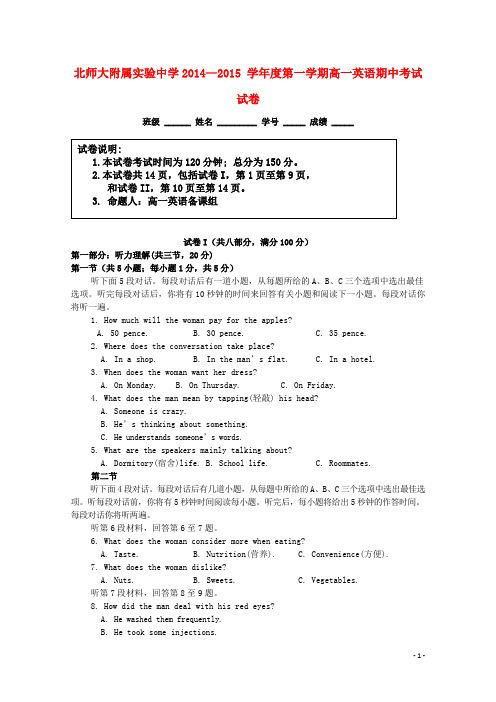
北师大附属实验中学2014—2015 学年度第一学期高一英语期中考试试卷班级 ______ 姓名 _________ 学号 _____ 成绩 _____试卷I(共八部分,满分100分)第一部分:听力理解(共三节,20分)第一节(共5小题;每小题1分,共5分)听下面5段对话。
每段对话后有一道小题,从每题所给的A、B、C三个选项中选出最佳选项。
听完每段对话后,你将有10秒钟的时间来回答有关小题和阅读下一小题。
每段对话你将听一遍。
1. How much will the woman pay for the apples?A. 50 pence.B. 30 pence.C. 35 pence.2. Where does the conversation take place?A. In a shop.B. In the man’s flat.C. In a hotel.3. When does the woman want her dress?A. On Monday.B. On Thursday.C. On Friday.4. What does the man mean by tapping(轻敲) his head?A. Someone is crazy.B. He’s thinking about something.C. He understands someone’s words.5. What are the speakers mainly talking about?A. Dormitory(宿舍)life.B. School life.C. Roommates.第二节听下面4段对话。
每段对话后有几道小题,从每题中所给的A、B、C三个选项中选出最佳选项。
听每段对话前,你将有5秒钟时间阅读每小题。
听完后,每小题将给出5秒钟的作答时间。
每段对话你将听两遍。
听第6段材料,回答第6至7题。
6. What does the woman consider more when eating?A. Taste.B. Nutrition(营养).C. Convenience(方便).7. What does the woman dislike?A. Nuts.B. Sweets.C. Vegetables.听第7段材料,回答第8至9题。
北京市海淀区教师进修学校附属实验中学2013-2014学年高一上学期期中考试英语试题

2013-2014学年度第一学期期中练习高一英语A 卷二、 单项选择 (每题1分,共15分)21. The horses each other the first prize in the match. A. completed against; for B. competed against; to C. competed against; for D. completed; to get22. The Lantern Festive the fifteenth day of the first lunar month. A is fallen on B. falls on C. is in D. is known for 23. The lion is the of courage.A. signalB. markC. animalD. symbol 24. There will be a in the village church on Saturday.A. receptionB. graduation ceremonyC. weddingD. Halloween 25. I in the street when I met an old friend of mine.A. walkedB. was walkingC. has walkedD. had walked 26. It is sad that his health by years of hard working.A. is destroyedB. destroyedC. is affectingD. is destroying 27. –Why don’t you _____ to a more sensible method? -- Well, I am thinking about it.A. switch onB. switch offC. switch overD. switch through 28. I am very busy with urgent things ____ every minute of the day.A. fill withB. filledC. fillingD. are filling 29. I was ____ excited at that moment _____ I didn’t kn ow what to say.A. such…thatB. too…thatC. rather…thatD. so…that 30. I don’t know when he _____ , but when he _____ I’ll tell him about it. A. will come; comes B. comes; comes C. comes; will come D. will come; will come 31. This kind of toy is_____ for children above three.A. promisedB. allowedC. designedD. used32. Many people complain _____ the problem in our society. I think volunteers are part of the solution _____ the problems!A. about, ofB. on , ofC. about, toD. on, to 33. That crossword is _____ too difficult to me.A. veryB. farC. soD. greatly 34. In the past ten years, there _____ great changes in our hometown.A. has beenB. areC. have beenD. were 35. –Did you ask Sophia for help?-- I _______ need to —I managed perfectly well on my own.A. wouldn’tB. don’tC. didn’tD. won’t 三、完形填空 (共20小题;每小题l 分,满分20分)装订线阅读下面短文,从短文后各题所给的四个选项(A、B、C和D)中,选出可以填入空白处的最佳选项,并在答题卡上将该项涂黑。
2014北京市重点中学高一期中考试英语试题和答案
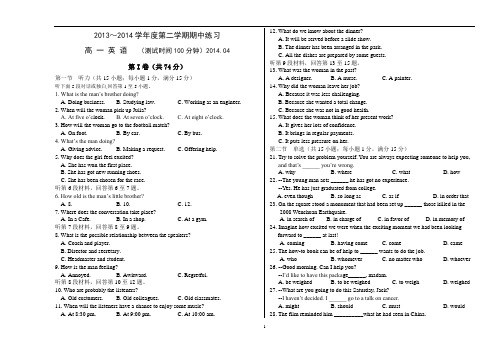
完形36—40 DABBC 41—45 CDACB 46—50 ABDCB 51--55ADDBC阅读56--58 CDD 59—61 BCB 62—64 DAB 65—67 BCA第II卷听力信息16. Tuesday 17. March 18. 2:00 19. toys 20. special阅读答题1. Skill, patience, hard work, and the right blocks.2. Clearly express your feelings and listen effectively as well.3. The importance of life skills/Life skills.写作Dear Peter,I’m very glad to hear that you will come to Beijing in July.I’m Li Hua, a boy of 16, presently studying in Beijing Yangguang Middle School, which you will visit. I’m very happy that you’ll live in my home during your stay in Beijing.I like science subjects very much, especially math, but my spoken English is so poor that I can’t communicate with foreigners fluently. So I think it’s a good chance to practice speaking English with you. By the way, NBA is my favorite game, and whenever I’m free, I will watch it on TV.Here I’d like to make some arrangements for your stay. Besides your team activities, I’ll show you around some famous museums, and on the weekend, we’ll go to enjoy Beijing opera to experience Chinese culture. What’s your opinion?Looking forward to getting your early reply soon.Sincerely yours,Li Hua。
北京师大附中2013-2014学年上学期高一年级期末考试数学试卷(AP班) 后有答案
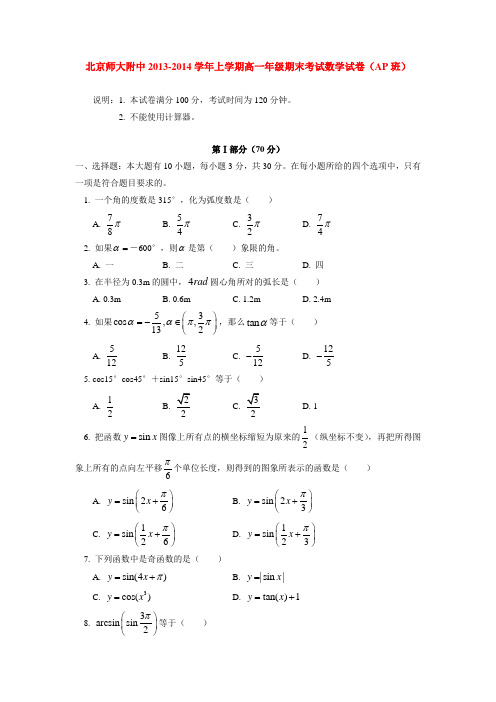
北京师大附中2013-2014学年上学期高一年级期末考试数学试卷(AP 班)说明:1. 本试卷满分100分,考试时间为120分钟。
2. 不能使用计算器。
第Ⅰ部分(70分)一、选择题:本大题有10小题,每小题3分,共30分。
在每小题所给的四个选项中,只有一项是符合题目要求的。
1. 一个角的度数是315°,化为弧度数是( ) A. 78π B. 54π C. 32π D. 74π 2. 如果=α-600°,则α是第( )象限的角。
A. 一 B. 二 C. 三 D. 四3. 在半径为0.3m 的圆中,4rad 圆心角所对的弧长是( )A. 0.3mB. 0.6mC. 1.2mD. 2.4m4. 如果53cos ,,132⎛⎫=-∈ ⎪⎝⎭ααππ,那么tan α等于( ) A. 512 B. 125 C. 512- D. 125- 5. cos15°cos45°+sin15°sin45°等于( )A. 12B. 2C.D. 16. 把函数sin =y x 图像上所有点的横坐标缩短为原来的12(纵坐标不变),再把所得图象上所有的点向左平移6π个单位长度,则得到的图象所表示的函数是( ) A. sin 26⎛⎫=+ ⎪⎝⎭y x π B. sin 23⎛⎫=+⎪⎝⎭y x π C. 1sin 26⎛⎫=+ ⎪⎝⎭y x π D. 1sin 23⎛⎫=+ ⎪⎝⎭y x π 7. 下列函数中是奇函数的是( ) A. sin(4)=+y x πB. |sin |=y xC. 3cos()=y xD. tan()1=+y x 8. 3arcsin sin 2⎛⎫ ⎪⎝⎭π等于( )A. 0B. 32πC. -1D. 2-π9. 已知角A 和角B 是△ABC 的两个内角,且sin(2)cos()0--<A B ππ,则△ABC 是( )A. 锐角三角形B. 直角三角形C. 钝角三角形D. 无法确定10. 设a 为正整数,已知函数sin 2⎛⎫=⎪⎝⎭y x π在区间[0,]a 内至少有两个最大值,则a 的最小值为( )A. 5B. 6C. 7D. 8 二、填空题:本大题有8小题,每小题3分,共24分。
北京师大附中2013-2014学年上学期高一年级期中考试数学试卷(ap班) 后有答案

北京师大附中2013—2014学年上学期高一年级期中考试数学试卷(AP 班)本试卷满分100分,考试时间为120分钟。
第Ⅰ部分(70分)一、选择题:本大题有9小题,每小题3分,共27分。
在每小题给出的四个选项中,只有一项是符合题目要求的。
1. 下列关系中正确的是( ) A. 0∈∅B. π∈QC. ∅∈{∅}D.2R ∈2. 已知2()f x x m =+,()(())g x f f x =,则()g x 等于( )A. 22()x m +B. 4x m + C. 22()x m m ++D. 42x m +3. 下列函数中,与函数||y x =表示同一个函数的是( )A. 33y x =B. 2y x =C. 2()y x =D. 2||x y x =4. 下列函数中为奇函数的是( )A. 3()1f x x =+ B. 34()f x x = C. 25()f x x =D. 3()f x x x =+5. 已知f (x )是区间(,)-∞+∞上的偶函数并且在区间(0,)+∞上是减函数,则下列关系中正确的是( )A. (3)(1)f f <-B. (3)(1)f f >-C. (3)(1)f f =-D. 二者无法比较6. 已知函数y=mx+4的图象中有一部分位于第四象限,则关于m 的取值下列说法中正确的是( )A. m=0B. m<0C. 0<m<1D. m>07. 函数3()41f x x x =-+在下列哪个区间中一定具有零点?( )A. (2,1)--B. (1,0)-C. (1,2)D. (2,3)8. 已知12x -<<,则下列不等式中正确的是( )A. 0||1x ≤<B. 1||2x <<C. 0||2x ≤<D. ||1x >9. 下列关系中正确的是( )A. 0.80.733<B. 0.10.10.750.75-<C. 0.10.1log 0.5log 0.6<D. 0.50.51.10.9--<二、填空题:本大题有6小题,每小题4分,共24分。
【英语】北京师范大学附属实验中学2014-2015学年高一上学期期中考试
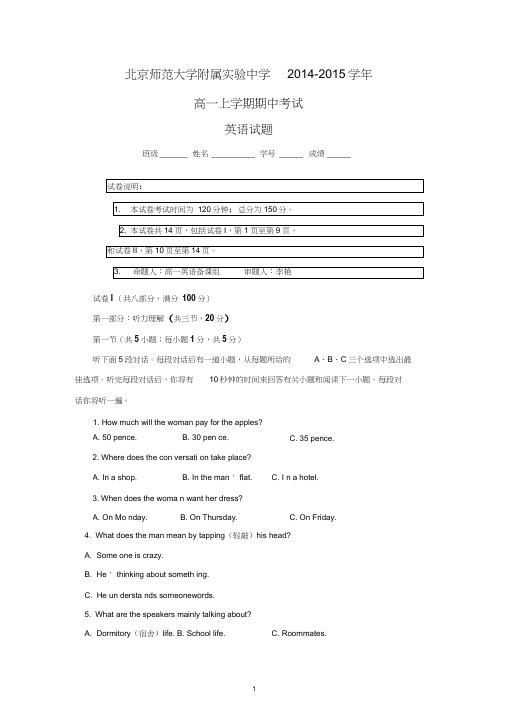
北京师范大学附属实验中学 2014-2015学年高一上学期期中考试英语试题班级 _______ 姓名 ___________ 学号 ______ 成绩 ______试卷I (共八部分,满分 100分) 第一部分:听力理解(共三节,20分) 第一节(共5小题;每小题1分,共5分)听下面5段对话。
每段对话后有一道小题,从每题所给的 A 、B 、C 三个选项中选出最佳选项。
听完每段对话后,你将有 10秒钟的时间来回答有关小题和阅读下一小题。
每段对话你将听一遍。
1. How much will the woman pay for the apples?4. What does the man mean by tapping (轻敲)his head? A. Some one is crazy.B. He ' thinking about someth ing.C. He un dersta nds someonewords.5. What are the speakers mainly talking about? A. Dormitory (宿舍)life. B. School life.A. 50 pence.B. 30 pen ce.2. Where does the con versati on take place? A. In a shop.B. In the man ' flat.3. When does the woma n want her dress? A. On Mo nday.B. On Thursday.C. 35 pence.C. I n a hotel.C. On Friday.C. Roommates.第二节听下面4段对话。
每段对话后有几道小题,从每题中所给的A、B、C 三个选项中选出最佳选项。
听每段对话前,你将有 5 秒钟时间阅读每小题。
听完后,每小题将给出 5 秒钟的作答时间。
北京市师大附中高一年级期中考试
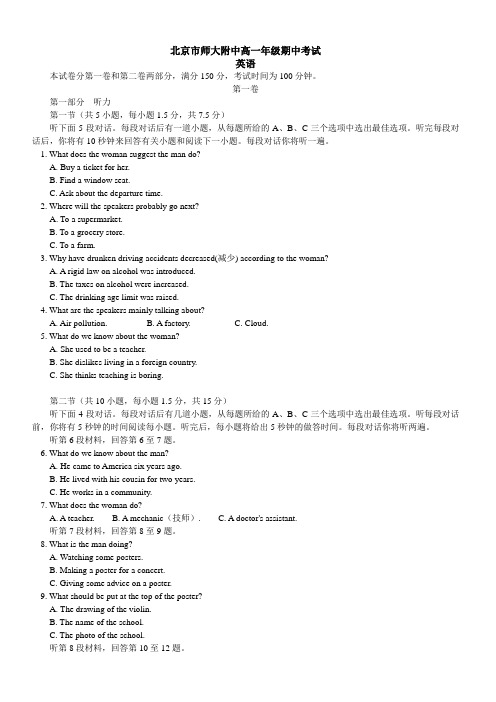
北京市师大附中高一年级期中考试英语本试卷分第一卷和第二卷两部分,满分150分,考试时间为100分钟。
第一卷第一部分听力第一节(共5小题,每小题1.5分,共7.5分)听下面5段对话。
每段对话后有一道小题,从每题所给的A、B、C三个选项中选出最佳选项。
听完每段对话后,你将有10秒钟来回答有关小题和阅读下一小题。
每段对话你将听一遍。
1. What does the woman suggest the man do?A. Buy a ticket for her.B. Find a window seat.C. Ask about the departure time.2. Where will the speakers probably go next?A. To a supermarket.B. To a grocery store.C. To a farm.3. Why have drunken driving accidents decreased(减少) according to the woman?A. A rigid law on alcohol was introduced.B. The taxes on alcohol were increased.C. The drinking age limit was raised.4. What are the speakers mainly talking about?A. Air pollution.B. A factory.C. Cloud.5. What do we know about the woman?A. She used to be a teacher.B. She dislikes living in a foreign country.C. She thinks teaching is boring.第二节(共10小题,每小题1.5分,共15分)听下面4段对话。
北京师大附中2013-2014学年上学期高一年级期中考试语文试卷(ap班) 后有答案
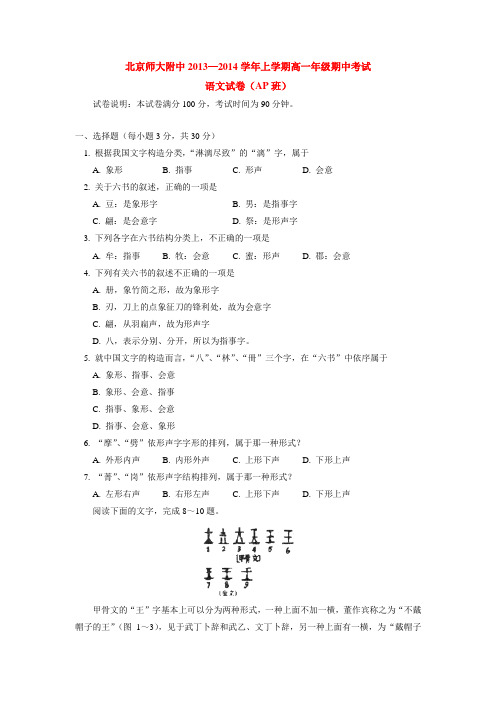
北京师大附中2013—2014学年上学期高一年级期中考试语文试卷(AP班)试卷说明:本试卷满分100分,考试时间为90分钟。
一、选择题(每小题3分,共30分)1. 根据我国文字构造分类,“淋漓尽致”的“漓”字,属于A. 象形B. 指事C. 形声D. 会意2. 关于六书的叙述,正确的一项是A. 豆:是象形字B. 男:是指事字C. 翩:是会意字D. 祭:是形声字3. 下列各字在六书结构分类上,不正确的一项是A. 牟:指事B. 牧:会意C. 蜜:形声D. 郡:会意4. 下列有关六书的叙述不正确的一项是A. 册,象竹简之形,故为象形字B. 刃,刀上的点象征刀的锋利处,故为会意字C. 翩,从羽扁声,故为形声字D. 八,表示分别、分开,所以为指事字。
5. 就中国文字的构造而言,“八”、“林”、“冊”三个字,在“六书”中依序属于A. 象形、指事、会意B. 象形、会意、指事C. 指事、象形、会意D. 指事、会意、象形6. “摩”、“劈”依形声字字形的排列,属于那一种形式?A. 外形内声B. 内形外声C. 上形下声D. 下形上声7. “菁”、“岗”依形声字结构排列,属于那一种形式?A. 左形右声B. 右形左声C. 上形下声D. 下形上声阅读下面的文字,完成8~10题。
甲骨文的“王”字基本上可以分为两种形式,一种上面不加一横,董作宾称之为“不戴帽子的王”(图1~3),见于武丁卜辞和武乙、文丁卜辞,另一种上面有一横,为“戴帽子的王”(图4~6),行用于其他各时期。
孙诒让《契文举例》所依据的刘鹗《铁云基藏龟》以武丁卜辞最多,其中的“王”字,孙诒让释为“立”,卜辞无法通读。
到罗振玉的《殷墟书契考释》才释出此字。
罗振玉首先把《说文解字》所收的古文和全文进行对比,释出“戴帽子的”是“王”字;接着指出,其异体作省其上画的形式,“亦‘王’字”,“且据所载诸文观之,无不谐也”。
“王”字释出来了,使一大批卜辞可以读通,也证实了这是殷王室的遗物。
北京市海淀区教师进修学校附属实验中学2013-2014学年高一上学期期中考试英语试题含解析

高一英语A卷Array出题人:底宏审核人:王舍翠一、听力理解(每小题1分,共20分)第一节听下面5段对话。
每段对话后有一个小题,从题中所给的ABC三个选项中选出最佳选项,并标在试卷的相应位置。
挺完美段对话后,你有10秒钟的时间来回答有关小题和阅读下一小题。
每段对话仅读一遍。
1.What will Dorothy do on the weekend?A. Go out with her friend.B. Work on her paper.C. Make some plans.2.What was the normal price of the T-shirt ?A.$15.B. $ 30.C. $50.3.What has the woman decided to do on Sunday afternoon?A.to attend a wedding.B. To visit an exhibition.C. To meet a friend.4.When does the bank close on Sunday?A.at 1:00 p.m.B. at 3:00 p.m.C. at 4:00 p.m.5.Where are the speakers?A.In a store.B. In a classroom.C. At a hotel.第二节听下面5段对话或独白。
每段对话或独白后有几小题,从题中所给的ABC三个选项中选出最佳答案,并标在试卷的相应位置。
听完每段对话后,你将有时间阅读各小题,每小题5秒钟;听完后,各小题将给出5秒钟的作答时间。
每段对话或独白读两遍。
听第6段材料,回答第6,7 小题6.What do we know about Nora?A.She prefers a room of her own.B. She likes to work with other girls.C.She lives near the city center.7. What is good about the flat?A. It has a large sitting room.B. It has good furniture.C. It has a big kitchen.听第7 段材料,回答第8,9题。
(整理版高中英语)师大附中第一学期期中考查高一英语试卷
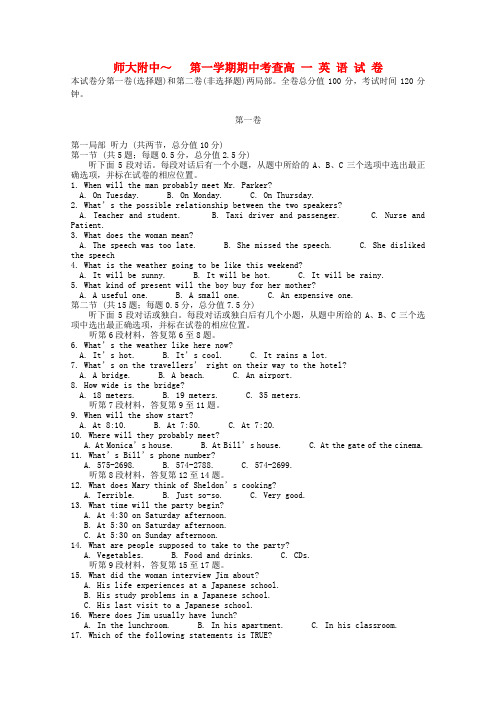
师大附中~第一学期期中考查高一英语试卷本试卷分第一卷(选择题)和第二卷(非选择题)两局部。
全卷总分值100分,考试时间120分钟。
第一卷第一局部听力 (共两节,总分值10分)第一节 (共5题;每题0.5分,总分值2.5分)听下面5段对话。
每段对话后有一个小题,从题中所给的A、B、C三个选项中选出最正确选项,并标在试卷的相应位置。
1. When will the man probably meet Mr. Parker?A. On Tuesday.B. On Monday.C. On Thursday.2. What’s the possible relationship between the two speakers?A. Teacher and student.B. Taxi driver and passenger.C. Nurse and Patient.3. What does the woman mean?A. The speech was too late.B. She missed the speech.C. She disliked the speech4. What is the weather going to be like this weekend?A. It will be sunny.B. It will be hot.C. It will be rainy.5. What kind of present will the boy buy for her mother?A. A useful one.B. A small one.C. An expensive one.第二节 (共15题;每题0.5分,总分值7.5分)听下面5段对话或独白。
每段对话或独白后有几个小题,从题中所给的A、B、C三个选项中选出最正确选项,并标在试卷的相应位置。
听第6段材料,答复第6至8题。
北京师大附中2013-2014学年上学期高一年级期末考试英语试卷 后有答案
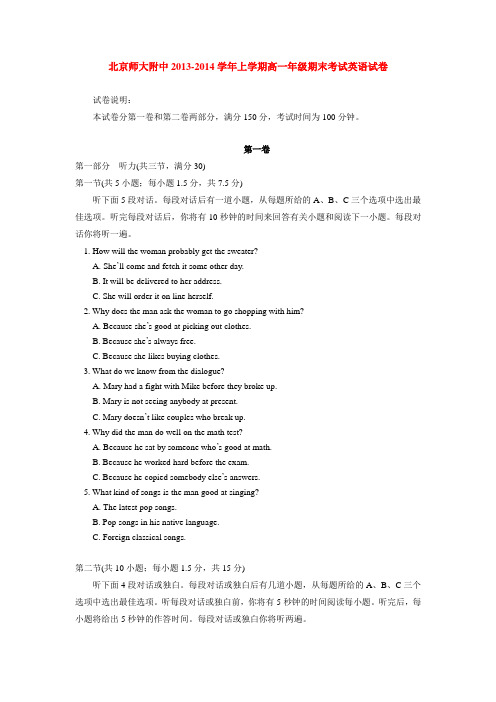
北京师大附中2013-2014学年上学期高一年级期末考试英语试卷试卷说明:本试卷分第一卷和第二卷两部分,满分150分,考试时间为100分钟。
第一卷第一部分听力(共三节,满分30)第一节(共5小题;每小题1.5分,共7.5分)听下面5段对话。
每段对话后有一道小题,从每题所给的A、B、C三个选项中选出最佳选项。
听完每段对话后,你将有10秒钟的时间来回答有关小题和阅读下一小题。
每段对话你将听一遍。
1. How will the woman probably get the sweater?A. She‟ll come and fetch it some other day.B. It will be delivered to her address.C. She will order it on line herself.2. Why does the man ask the woman to go shopping with him?A. Because she‟s good at picking out clothes.B. Because she‟s always free.C. Because she likes buying clothes.3. What do we know from the dialogue?A. Mary had a fight with Mike before they broke up.B. Mary is not seeing anybody at present.C. Mary doesn‟t like couples who break up.4. Why did the man do well on the math test?A. Because he sat by someone who‟s good at math.B. Because he worked hard before the exam.C. Because he copied somebody else‟s answers.5. What kind of songs is the man good at singing?A. The latest pop songs.B. Pop songs in his native language.C. Foreign classical songs.第二节(共10小题;每小题1.5分,共15分)听下面4段对话或独白。
北京师大附中2014-2015学年上学期高一年级期中考试英语试卷 后有答案

北京师大附中2014-2015学年上学期高一年级期中考试英语试卷试卷说明;本试卷满分150分。
考试时间为100分钟。
第Ⅰ卷一、听力理解。
(共25分)(1)听下面2段对话或独白。
每段对话或独白后有几道小题,从每题所给的A、B、C三个选项中选出最佳选项。
每段对话或独白你将听两遍。
听第l段材料,回答第1至2题。
(每小题1分,共5分)1. How did the speaker probably feel after she saw the items sent to her?A. Angry.B. Surprised.C. Pleased.2. What can we learn from the speaker?A. The store apologized to her.B. Her complaint was ignored.C. She received the correct order.听第2段材料,回答第3至5题。
3. When will the school bus arrive at the dam tomorrow?A. At 7:45 a.m.B. At 8:00 a.m.C. At 11:00 a.m.4. Where will the speakers stay during the night?A. In tents.B. in a youth hotel.C. In small houses.5. Why will the speakers take this two-day trip?A. To enjoy the scenery.B. To relax themselves,C. To complete a task.(2)听下面四位专家谈论未来,听完后,请从所给的A-G选项中选择他们所谈论的话题。
录音将放两遍。
(每小题1分,共4分)Expert 1: Expert 2:Expert 3: Expert 4:Topics:A. A new virusB. Two twinsC. The earthD. Sea levelE. HealthF. Artificial humansG. Climate change(3)听下面一段关于国际组织Global Campaign For Education(GCE)的介绍,根据录音将以下表格信息填写完整。
北京市师大附中高一英语上学期期中试卷
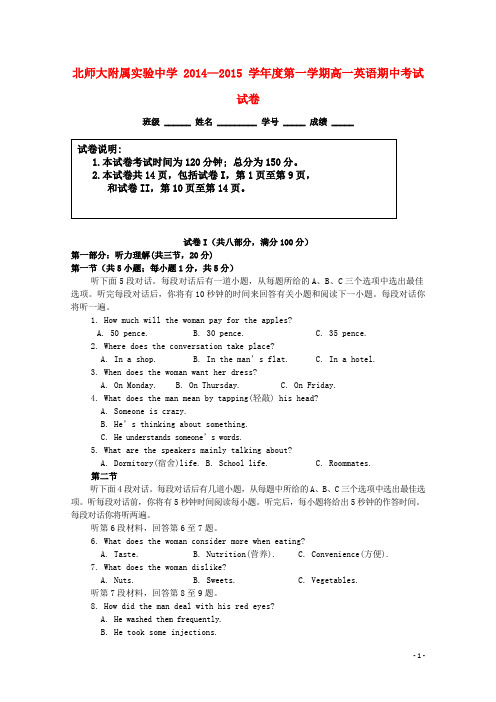
北师大附属实验中学 2014—2015 学年度第一学期高一英语期中考试试卷班级 ______ 姓名 _________ 学号 _____ 成绩 _____试卷I(共八部分,满分100分)第一部分:听力理解(共三节,20分)第一节(共5小题;每小题1分,共5分)听下面5段对话。
每段对话后有一道小题,从每题所给的A、B、C三个选项中选出最佳选项。
听完每段对话后,你将有10秒钟的时间来回答有关小题和阅读下一小题。
每段对话你将听一遍。
1. How much will the woman pay for the apples?A. 50 pence.B. 30 pence.C. 35 pence.2. Where does the conversation take place?A. In a shop.B. In the man’s flat.C. In a hotel.3. When does the woman want her dress?A. On Monday.B. On Thursday.C. On Friday.4. What does the man mean by tapping(轻敲) his head?A. Someone is crazy.B. He’s thinking about something.C. He understands someone’s words.5. What are the speakers mainly talking about?A. Dormitory(宿舍)life.B. School life.C. Roommates.第二节听下面4段对话。
每段对话后有几道小题,从每题中所给的A、B、C三个选项中选出最佳选项。
听每段对话前,你将有5秒钟时间阅读每小题。
听完后,每小题将给出5秒钟的作答时间。
每段对话你将听两遍。
听第6段材料,回答第6至7题。
6. What does the woman consider more when eating?A. Taste.B. Nutrition(营养).C. Convenience(方便).7. What does the woman dislike?A. Nuts.B. Sweets.C. Vegetables.听第7段材料,回答第8至9题。
(整理版高中英语)师大附中第一学期期中考试高一年级(英语

师大附中—度第一学期期中考试高一年级〔英语必修1〕试题第一局部:英语知识运用〔总分值50分〕第一节:语音知识〔共5小题,每题1分,总分值5分〕从A、B、C、D四个选项当中,找出与所给单词划线局部发音相同的选项。
1. identityA. invitationB. frightenC. qualityD. willing2. leagueA. steakB. breadC. creamD. headline3. youthA. thunderB. fatherC. neitherD. breathe4. judgeA. usualB. sufferC. clueD. tune5. damA. villageB. activeC. qualityD. damage第二节:语法和词汇知识〔共15题;每题1分,总分值15分〕从A、B、C、D四个选项当中,选出可以填入空白处的最正确选项。
6. As ___ matter of fact, ____ beauty of ____ nature made a good impression on me.A: a; the; / B: a; the; theC: the; the; / D: a; /; the7. _____ he took part in the competition, he won the first prize.A: For the first time B: At a timeC: At one time D: The first time8. Last week, only two persons came to look at the house, _____ wanted to buy it.A: none of them B: both of themC: none of whom D: neither of whom9. He is the only one of the three students____ got the new idea.A: who have B: whom haveC: who has D: whose had10. ----I hear they will get married tomorrow.----_______.A: Good luck. B: Congratulations.C: Oh, really? D: Yes, sir.11. Every player is playing their best. It seems _____ our team is going to win.A: even if B: if onlyC: as if D: only if12. The newly-founded company is faced with lots of trouble, _____ the financial problem is not the worst.A: which B: of whichC: to whom D: with whom13. Mr. Li is now out of ____ and it is not easy for him to find a ____.A: work; work B: job; workC: job; job D: work; job14. A group of American soldiers were walking along the road in Iraq when a bomb was___, three of whom were killed.A: set about B: set outC: set up D: set off15. I really wonder how he ____ that to his teacher.A: dare to say B: dare sayingC: not dare day D: dared say16. A notice was ____ in order to remind the students of the changed lecture time.A: sent up B: given upC: set up D: put up17. Half of the land there ___ to the Smiths, but half of the apple trees __ ours.A: belong; are B: belonged; isC: belongs; is D: belongs; are18. It ___ we had stayed together for a couple of weeks____ I found we had a lot in common.A: was until; when B: was until; thatC: wasn’t until; when D: wasn’t until;that19. The____ look on her face suggested that she ____ so surprised by our performance.A: surprised; was B: surprising; should beC: surprised; be D: surprising; was20. At present, a large number of tress ______ around the world.A: are being cut down B: are being cut acrossC: is being cut down D: is being cut up第三节:1)完形填空〔共20小题,每题分,总分值30分〕阅读下面短文,从短文后各题所给A、B、C、D四个选项中,选出可以填入空白处的最正确答案。
北京师大附中高一英语上学期期中考试试题【会员独享】

北京师大附中高一英语上学期期中考试试题【会员独享】(满分150分,考试时间100分钟)第Ⅰ卷第一部分:听力理解(共三节,30分)第一节(共5小题:每小题1.5分,共7.5分)听下面5段对话。
每段对话后有一道小题,从每题所给的A、B、C三个选项中选出最佳选项。
听完每段对话后,你将有10秒钟来回答有关小题和阅读下一小题。
每段对话你将听一遍。
1. What can we learn from the conversation?A. The woman has seen the play.B. The woman doesn’t like the play.C. The man lost the ticket for the play.2. Where will the man go first after class?A. To the bar.B. To the library.C. To the teacher’s office.3. How does the man go to work now?A. By car.B. By bus.C. By subway.4. What does the woman mean?A. Grandma can’t adjust to a new place.B. Grandma will enjoy living with the family soon.C. Grandma thinks it is funny to live with the family.5. What will the girl buy?A. Some soap.B. A hairbrush.C. A toothbrush.第二节(共10小题; 每小题1.5分,共15分)听下面4段对话。
每段对话后有几道小题,从每题所给的A、B、C三个选项中选出最佳选项。
听每段对话前,你将有5秒钟的时间阅读每小题。
北京师范大学平果附属学校20132014学年高一教学上学期第一次检测英语习题含答案

北师大平果隶属学校2013-2014学年高一英语阶段检测试卷(考试时间:90分钟,满分110分)第一部分:听力(20分)第一节(共5小题,每题1分,共5分)听下边5段对话。
每段对话后有一道小题,从每题所给的A、B、C 三个选项中选出最正确选项。
听完每段对话后,你将有10秒钟的时间往返答相关小题和阅读下一小题。
isthewoman?theoffice B.InBed C.Inaclockrepairshop2.Whatwilltheydo?willseetheboy ’steacher.B.Theywillmeettheboy ’sfriend.3.Howdoesthewomanfeelaboutthejobnow?A.BoringB.FunC.InterestingWhatisMissSmithgoingtodo?Watchthemanplayfootball.WatchDavidplayfootball.WatchDavid’sfriendplayfootball. Whendoestheconversationmostprobablytakeplace?Atmidnight.B.Intheevening.C.Atdawn.第二节(共15小题;每题 1分,满分15分)听下边5段对话或独白。
每段对话或独白后有几个小题,从题中所给的A,B,C三个选项中选出最正确选项,并标在试卷的相应地点。
听每段对话或独白前,你将有时间阅读各个小题,每题5秒钟;听完后,每题将给出5秒钟的作答时间。
每段对话或独白读两遍。
听第6段资料,回答第6至8题。
Whereisthemanagernow?He’sintheshopservingthewoman.He’son hiswayhome.Hehasgoneforlunch.Whendidthewomanbringthewatchin?Oneweekago.B.Amomentago.Shedoesn’tseemtoremember. Whywasthereceiptstilltherewhenthewomancameback?A.Becauseshethoughtshedidn ’tneedit.B.Becauseshedroppeditwhensheleft.C.Becausethemanagerdidn ’tgiveittoher.听第7段资料,回答第9至11题。
- 1、下载文档前请自行甄别文档内容的完整性,平台不提供额外的编辑、内容补充、找答案等附加服务。
- 2、"仅部分预览"的文档,不可在线预览部分如存在完整性等问题,可反馈申请退款(可完整预览的文档不适用该条件!)。
- 3、如文档侵犯您的权益,请联系客服反馈,我们会尽快为您处理(人工客服工作时间:9:00-18:30)。
北京师大附中2013—2014学年上学期高一年级期中考试英语试卷(AP班)本试卷满分130分,考试时间为90分钟PART ⅠSection Ⅰ. V ocabulary:Choose the word that best completes the sentence: (30 points, 1 point each)1. She prefers ________________ colors; black and grey are her least favorite.A. affluentB. mechanicalC. brilliantD. competitive2. In his election campaign, the candidate stressed the ___________ of change, which won much support.A. urgencyB. spiralC. incidentD. deposit3. He _____________ his ex-girlfriend through the window as he walked past the shop.A. nestedB. glidedC. protestedD. glimpsed4. All of us were _____________ by the young woman's piano skills.A. adaptedB. amazedC. attractedD. admired5. Wool has a(n)_____________ to shrink when washed.A. assignmentB. tendencyC. distanceD. limitation6. Are students at your school ______________ to tweet during classes?A. disputedB. allowedC. behavedD. exposed7. My grandpa met a few of his friends at the senior _____________ on Nathan Road.A. centerB. marketC. stationD. hotel8. It may be possible to ______________ the damaged statue to its original condition.A. weighB. informC. portrayD. restore9. The chairman of the company's _______________ of directors has decided to retire.A. boardB. stationC. privacyD. treatment10. These dumbbells are great for _____________ at home.A. giving upB. handing downC. working outD. setting free11. This community event is sponsored each year by a local _________________.A. conscienceB. responsibilityC. bankD. objection12. That charitable ________________ has raised over a US$5 million for medical relief.A. signatureB. foundationC. nationalityD. advantage13. My uncle soon discovered that he ____________ an aptitude for business.A. settledB. lackedC. insistedD. warned14. The first novel by the young author ____________ a sensation in France.A. createdB. isolatedC. starvedD. adjusted15. Diamonds are among the most ________________ jewels in the world.A. athleticB. preciousC. devotedD. obedient16. My teacher shows no _______________ for students who cheat on exams.A. attendanceB. aptitudeC. pursuitD. sympathy17. Instead of ____________ every word you don't know, you should guess its meaning from the context.A. extending far beyondB. popping intoC. bridging the gap ofD. looking up18. Shoes of this color are ____________ not available. I'll put you on the waiting list.A. thoroughlyB. currentlyC. merelyD. remotely19. To ___________ his store's losses, the owner decided to put everything on sale.A. clutchB. requireC. recoupD. conduct20. The fire broke out in the ______________ mountain area and spread quickly.A. remoteB. indoorC. dominantD. critical21. As the firewood ________________ in the fire, Tim told me about his adventure.A. crackledB. besiegedC. modernizedD. sponsored22. A labor ___________________ has forced many companies to hire workers from other countries.A. sincerityB. sympathyC. sensationD. shortage23. All freshmen in college have to study Chinese and English; other language courses are ________________.A. emotionalB. flushC. optionalD. urgent24. I _______________ three high school students complaining about their heavy workload on the bus.A. modernizedB. boomedC. overheardD. sponsored25. The robber ______________ a woman's bag and ran away quickly.A. fazedB. grabbedC. soaredD. tweeted26. It took the climbers several more hours to reach the _____________ of the highest peak.A. journeyB. cushionC. summitD. parcel27. The ______________ of some of the tulips were pink, while others were yellow.A. petalsB. tribesC. skirtsD. navies28. To get the necessary information, we collected _____________ through surveys and interviews.A. smogB. dataC. povertyD. linen29. Total attendance during the three-day event was ____________ to be between 6,000 and 7,000 persons.A. illustratedB. succeededC. achievedD. estimated30. This appears to be the metal ______________ from an ancient spear.A. tipB. dialC. clueD. bullSection Ⅱ: Reading comprehension (50 points, 2 points each)AAs you move around your home, take a good look at the things you have. It is likely that your living room will have a television set and a video, and your kitchen a washing machine and a microwave oven. Your bedroom drawers will be filled with almost three times as many clothes as you need. You almost certainly own a car and possibly a home computer, holiday abroad at least once a year and eat out at least once a week.Now, perhaps, more than ever before, people are wondering what life is all about, and what it is for. Seeking material success is beginning to trouble large numbers of people around the world. They feel that the long-hours work culture to make more money to buy more things is eating up their lives, leaving them very little time or energy for family or pastimes. Many are turning to other ways of living and downshifting is one of them.Six percent of workers in Britain took the decision to downshift last year. One couple who downshifted is Daniel and Liz. They used to work in central London. He was a newspaper reporter and she used to work for an international bank. They would go to work by train every day from their large house in the suburbs, leaving their two children with a nanny (保姆). Most evenings Daniel wouldn't get home until eight or nine o'clock, and nearly twice a month he would have to fly to New York for meetings. They both earned a large amount of money but began to feel that life was passing them by.Nowadays, they run a farm in the mountains of Wales. "I always wanted to have a farm here," says Daniel; "and we took almost a year to make the decision to downshift. It's taken some getting used to, but it's been worth it. We have to think twice now about spending money on car repairs and we no longer have any holidays. However, I think it's made us stronger as a family, and the children are a lot happier."Liz, however, is not quite sure. "I used to enjoy my job, even though it was hard work and long hours. I'm not really a country girl, but I suppose I'm gradually getting used to looking after the animals. One thing I do like, though, is being able to see more of my children. My advice for other people wanting to do the same is not to think about it too much or you might not do it at all."31. What do the first two paragraphs tell us?A. People seldom work long hours to make money.B. People hardly buy more things than necessary.C. People are sure everything they own is in the fight place.D. People realize there is more to life than just making money.32. When Daniel was a reporter he _________________.A. lived in central LondonB. disliked his jobC. missed his childrenD. was well paid33. Daniel and Liz both agree that the move to the farm ________________.A. was easy to organizeB. has improved family lifeC. was extremely expensiveD. has been a total success34. What does the underlined "it" in the last paragraph refer to?A. Child-caring.B. Liz's advice.C. Downshifting.D. Liz's job.35. The underlined word "downshifting" in Paragraph 2 means ____________.A. repairing your car by yourselfB. spending money carefullyC. moving out to the countryside to live a simpler and better lifeD. living in a big house in the suburbs and dining out once a weekBElephants don't forget—at least, female elephants don't. Elephant families are matriarchal. And the social knowledge gained by the oldest females is the key to a family group's survival, according to a study published in April by Karen McComb, a biologist at Sussex University in England.Elephants announce their presence by making a deep, long sound, a practice referred to as contact calling. An unfamiliar call may mean that an elephant from outside the family group is nearby. A stranger can cause trouble, interrupting feeding or disturbing the young. So an elephant matriarch signals the family to gather around her; then they all lift their trunks in the air to smell the unfamiliar caller. False alarms can disturb the group and take time and energy away from feeding, so survival may depend in part on getting it right.Working with Cynthia Moss, who founded the Amboseli Elephant Research Project in Kenya 30 years ago, McComb tested the social knowledge of 21 Amboseli elephant families with matriarchs 27 to 67 years old. She played recordings of contact calls to each family and found that the oldest matriarchs were much better at picking out unfamiliar calls. In fact, a group with a matriarch in her fifties was several thousand times more likely to form into a group upon hearing an unfamiliar contact call than when hearing a familiar call. However, families with younger matriarchs were less than twice as likely to gather together upon hearing an unfamiliar contact call as compared with a familiar call. And they gathered together a lot. Moreover, the social knowledge of older matriarchs translated into favorable results: Families with older matriarchs produced more baby elephants in each female-reproductive year.This finding shows how difficult it is to protect the oldest members of elephant families. As elephants age, they continue to grow larger, as do their much wanted tusks. So the older—and wiser—a matriarch is, the greater the chance she will be killed. About 800 000 elephants have been killed by people in the past 20 years.36. What does the underlined word "matriarch" mean?A. An old member of an elephant family.B. A female head of an elephant family.C. A wise elephant.D. A large elephant.37. The research with recordings of contact calls shows _________________.A. how fast elephants form into groupsB. how important the age of a leading elephant isC. how frightened elephants are when hearing a strange callD. how frequently old elephants call other members of the family38. The older a female elephant is, _______________________.A. the stronger she will beB. the poorer memory she will haveC. the more useless her tusks will beD. the more likely she will be killed39. We can infer from the passage that elephants may _______________.A. run into other elephant familiesB. give wrong warnings to their mothersC. run away upon hearing a strange soundD. produce more babies by gathering together more oftenCSo much sentimentality is attached to the rose in popular culture that it is difficult to separate the original mythological and folkloric beliefs from the emotional excess that surrounds the flower. Yet if we look into the beliefs, we find that the rose is much more than the mere symbol of romantic love invoked by every minor poet and painter.One of the rose's most common associations in folklore is with death. The Romans often decked the tombs of the dead with roses; in fact, Roman wills frequently specified that roses were to be planted on the grave. To this day, in Switzerland, cemeteries are known as rose gardens. The Saxons equated the rose with life, and they believed that when a child died, the figure of death could be seen plucking a rose outside the house.The rose has a long association with female beauty. Shakespeare mentions the rose more frequently than any other flower, often using it as a token of all that is lovely and good. For the Arabs, on the other hand, the rose was a symbol not of feminine but of masculine beauty.Later the rose became a sign of secrecy and silence. The expression sub rosa, "under the rose," is traced to a Roman belief. During the sixteenth and seventeenth centuries, it was common practice to carve or paint roses on the ceilings of council chambers to emphasize the intention of secrecy.40. The underlined word sentimentality in paragraph 1 is closest in meaning to __________.A. confusionB. beautyC. feelingD. popularity41. The underlined word decked in paragraph 2 is closest in meaning to __________.A. paintedB. separatedC. decoratedD. disguised42. The underlined word token in paragraph 3 is closest in meaning to __________.A. symbolB. proofC. justificationD. contradiction43. The underlined phrase sub rosa in paragraph 4 means __________.A. romanticallyB. intentionallyC. secretlyD. commonlyDThe role of government in the economyBecause most people do not volunteer to pay taxes or police their own financial affairs, governments cannot influence economic activity simply by asking people to pollute less, to give money to the poor, or to be innovative. To accomplish these things, governments have to pass laws. Since the early twenties century, governments of countries with advanced industrial or service economies have been playing an increasing role in economics. This can be seen in the growth of government taxation and spending, in the growing share of national income devoted to income-support payments, and by the enormous increase in the control of economic activity.The large-scale organization of business, as seen in mass production and distribution, has led to the formation of large-scale organizations - corporations, labor unions, and government structures - that have grown in importance in the past several decades. Their presence and growing dominance have shifted capitalist economies away from traditional market forces and toward government administration of markets.In the United States, government provides a framework of laws for the conduct of economic activity that attempt to make it serve the public interest. For instance, the individual states and the federal government have passed laws to shield investors against fraud. These laws specify what information has to be disclosed to prospective investors when shares of stocks or bonds are offered for sale. Another important area of law concerns the labor force, such as regulation of work hours, minimum wages, health and safety conditions, child labor, and the rights of workers to form unions, to strike, to demonstrate peacefully, and to bargain collectively through representatives of their own choosing.In other nations, the ways in which governments intervene in their economies has varied; however, governments everywhere deal with essentially the same issues and participate in economic activity. Even governments that are reluctant to regulate commerce directly have undertaken large-scale projects such as hydroelectric and nuclear energy developments, transportation networks, or expansion of health, education, and other public services.44. According to the passage, why do governments intervene(干涉)in economic activity?A. People do not willingly regulate their own business affairs.B. Governments understand the economy better than anyone else does.C. Business pay governments to participate in economic activity.D. The economy would fail without the help of government.45. The underlined word This in paragraph 1 refers to __________.A. economic activityB. asking people to pollute lessC. the early twentieth centuryD. increasing role in economics46. According to the passage, how has the growth of large-scale organizations such as corporations and labor unions affected capitalist economies?A. It has forced governments to pass laws protecting traditional markets.B. It has destroyed capitalism and replaced it with government ownership.C. It has led to the increasing role of government in economic activity.D. It has caused unfair competition between large and small businesses.47. The author mentions laws to shield investors against fraud in paragraph 3 as an example of _______________________.A. laws that organize businessB. laws that serve the public interestC. laws that protect the labor forceD. laws that set the price of stocks48. The underlined word their in paragraph 3 refers toA. individual statesB. lawsC. workersD. unions49. What point does the author make about governments that do not want to regulate business directly?A. They cannot compete effectively with government-controlled economies.B. They have capitalist economies based on traditional market forces.C. They have no laws for protecting the environment and public health.D. They participate in the economy through public projects and services.ERoad Building and the AutomobileCar registrations in the United States rose from one million in 1913 to ten million in 1923. By 1927, Americans were driving some twenty-six million automobiles, one car for every five people in the country. Automobile scales in the state of Michigan outnumbered those in Great Britain and Ireland combined. For the first time in history, more people lived in cities than on farms, and they were migrating to the city by automobile.The automobile was every American's idea of freedom, and the construction of hard surface roads was one of the largest items of government expenditure, often at great cost to every-thing else. The growth of roads and the automobile industry made cars the lifeblood of the petroleum industry and a major consumer of steel. The automobile caused expansions in outdoor recreation,tourism and related industries - service stations, roadside restaurants, and motels. After 1945, the automobile industry reached new heights, and new roads led out of the city to the suburbs, where two-car families transported children to new schools and shopping malls.C 1-1348. (1)What's the main topic of the lecture?A. The reading assignmentB. The course requirements for good marksC. The course paper for the end of the semesterD. Questions about specific topic for the course paper49. (2)How can students receive a good grade?A. Students must submit as many written papers as possibleB. The oral presentation must cover various subjectsC. Students have to try hard to achieve the four major requirementsD. Students need to write a course paper about the broad topics discussed in classA 1-2350. (2)Why does the man talk with the woman?A. To go to the party with the womanB. Because making jack-o'-lantern is funC. To talk about Halloween costumesD. To borrow the woman's costumes from last yearA 1-2651. (1)Why does Cindy ask John about the cafeteria?A. She is curious to see itB. She was looking for a place to eatC. She wants to know the location for JennyD. John is not having lunch today52. (2)Why doesn't Cindy want the food at the cafeteria?A. The cafeteria is not cleanB. She is sick from food poisoningC. John got sick from eating at the cafeteriaD. She has a bad memory about the foodB 1-2753. (1)Why do the students discuss cloning?A. Because it is a very surprising subjectB. Because the students do not know about itC. Because a student has trouble finding the right topic for sociology classD. Because they admire scientists54. (2)Which reason does Jason say that cloning is bad?A. It helps sick peopleB. It enables vital body parts to growC. People are too religiousD. It ruins the spirit of GodC 1-2855. (1)What is the main purpose of the lecture?A. To illustrate how Roman doctors were in the first centuryB. To show how great, the roman emperor wasC. To explain why the roman army was so strongD. To compare roman doctors with modern doctors56. (2)Why did roman doctors attend the army's medical school according to the lecture?A. The civil war was importantB. They were keys to the armyC. They had fairly low statusD. The roman army did not have doctorsA 1-3057. (1)What is the main purpose of this conversation?A. The man shows how he is well-prepared for the testB. The man believes the woman does not understand his problemC. The man wants to know if the teacher can review his outline before the testD. The teacher is very busy with the students58. (2)Why does the woman think everything will work out just fine?A. The man looks concernedB. The teacher will look at the man's outlines before the examC. The teacher has many students to helpD. The man already has outlines for examC 1-3259. (1)What is the lecture trying to show the students?A. War is necessary in human historyB. Nations always solve their disagreements peacefullyC. Negotiations are always difficultD. War happens because of human nature60. (2)According to the lecture, what is not a reason for one nation to argue with another nation?A. Human rightsB. Hunting and gatheringC. Injustices in the pastD. BordersA 2-0361. (1)What is the procedure when a library card is lost?A. Just make a new cardB. Cancel the previous one, and never issue it againC. Cancel the lost card and make a new oneD. Just tell the librarian that the card is lostA 2-0762. (1)What subject is the woman concerned about?A. EconomicsB. Political scienceC. U.S. politicsD. The U.S. constitution63. (2)What does the main suggest that the woman do to do well in political science?A. Concentrate on vocabulary, laws, and eventsB. Focus on the vocabulary and laws onlyC. Concentrate on the vocabulary and events onlyD. Focus on the terms, lawyers, and eventsB 2-0864. (1)Why doesn't Cindy take Spanish class next semester?A. Because Mr. Rodriguez is not teaching next semesterB. Because Mr. Rodriguez is not teaching anymoreC. Because Mr. Rodriguez is teaching French next semesterD. Because Mr. Rodriguez is teaching English next semester65. (2)Why is Annie convincing Cindy to continue to take Spanish class next semester?A. Because Cindy might forget SpanishB. Because Cindy might not be able to take Spanish anymoreC. Because Annie wants to take a foreign language with CindyD. Because Cindy might forget FrenchD 2-1066. (1)What role did Pocahontas play between the British colony and the native Americans?A. Pocahontas was a spy for the British colonistsB. Pocahontas was an agent for the British colonists and the SpanishC. Pocahontas was a spy for the SpanishD. Pocahontas was a mediator between the British colony and the Spanish67. (2)What did the marriage between Pocahontas and John Rolfe do to the war between the British colony and the native Americans?A. The marriage started a warB. The marriage brought freedomC. The marriage brought hatredD. The marriage ended the warA 2-1168. (1)Why does the student like Ms. Mckenna so much?A. Ms. Mckenna spoke softly, explained carefully, and answered all the questions seriouslyB. Ms. Mckenna gave good grades to studentsC. The student knows Ms. Mckenna personallyD. Ms. Mckenna spoke loudly but explained thoroughly69. (2)What did the student realize at the end of the conversation?A. Miss Davis made the student realize that nothing is important but mathB. The student realized that she can do things if she tries hardC. Miss Davis made the student realize that Ms. Mckenna is a good teacherD. Miss Davis made the student realize that nothing is possibleAnswer Sheet for PART ⅡⅠ. Choose the word from the box that best completes the sentence and write down your answers on the answer sheet:(20 points, 1 point each)1. ____________________ 11. ____________________2. ____________________ 12. ____________________3. ____________________ 13. ____________________4. ____________________ 14. ____________________5. ____________________ 15. ____________________6. ____________________ 16. ____________________7. ____________________ 17. ____________________8. ____________________ 18. ____________________9. ____________________ 19. ____________________10. ___________________ 20. ____________________Ⅱ. Matching:(10 points, 0.5 point each)Choose the definition for each English word and write your answers on the answer sheet.1-5: ____,____,____,____,____,6-10: ____,____,____,____,____,11-15: ____,____,____,____,____,16-20: ____,____,____,____,____.Ⅲ. Translate the following sentences into English:(10 points, 2 points each)1. ___________________________________________________________________________ _______________________________________________________________________________2. ___________________________________________________________________________ _______________________________________________________________________________3. ___________________________________________________________________________ _______________________________________________________________________________4. ___________________________________________________________________________ _______________________________________________________________________________5. ___________________________________________________________________________ _______________________________________________________________________________Ⅳ. Translate the following words into Chinese:(10 points, 1 point each)1. __________________ 6. __________________2. __________________ 7. __________________3. __________________ 8. __________________4. __________________ 9. __________________5. __________________ 10. _________________【试题答案】PART ⅠSection Ⅰ. V ocabulary:Choose the word that best completes the sentence: (30 points, 1 point each)1-10 CADBB BADAC11-20 CBBAB DDBCA21-30 ADCCB CABDASection Ⅱ: Reading comprehension (50 points, 2 points each)Passage A: 31-35 DDBCCPassage B: 36-39 BBDAPassage C: 40-43 CCACPassage D: 44-49 ADCBCDPassage E: 50-55 DBACBAPART ⅡⅠ. Choose the word from the box that best completes the sentence and write down your answers on the answer sheet: (20 points, 1 point each)1. harmony 11. lounge2. advocate 12. mature3. howling 13. modest4. compensates 14. negotiating5. innocent 15. obtain6. instruction 16. optimistic7. diverse 17. poisonous8. lame 18. primitive9. liberation 19. relevant10. ambiguous 20. permanentⅡ. Matching: (10 points, 0.5 point each)Choose the definition for each English word and write your answers on the answer sheet.1-5: fable 6-10: night 11-15: crops 16-20: dmjkwⅢ. Translate the following sentences into English: (10 points, 2 points each)1. When you learn a foreign language, it is important to make good use of dictionaries.2. Neither cash nor a credit card is useful on a deserted island.3. Sometimes children are confused about whether all the information on television is true ornot.4. For example, spoiled children are very likely to become self-centered adults.5. It is said that games teach cooperation, which is one of the most important factors of success, and they also teach how to overcome challenges.Ⅳ. Translate the following words into Chinese: (10 points, 1 point each)1. hookn. 钩,镰刀,钩状v. 挂……于钩上,引上钩,钩住;弯成钩状,钩紧2. deliberately adv. 慎重地;故意地,蓄意地;谨慎地;从容不迫地,不慌不忙地3. inspirev. 使感动,启示,激发;吸入;赋予灵感4. 显微镜5. occupationn. 职业,占有期间,占有6. pedestriann. 行人,步行者adj. 徒步的,通俗的,呆板的7. adequateadj. 足够的,能满足需要的;胜任的;适当的;差强人意的,尚可的8. postponev. 推迟,延迟,使延期9. prejudicen. 偏见,伤害,成见v. 使存偏见,伤害,使有成见10. regulationn. 规章;条例;规则,规定;管理。
